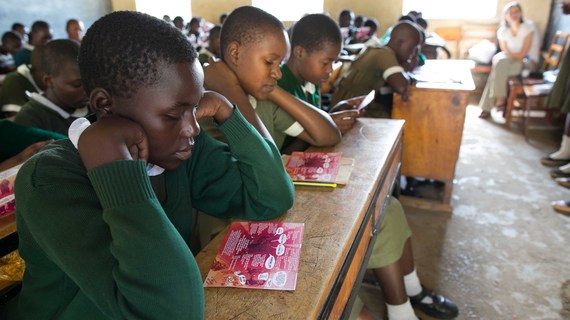My 9-year-old daughter goes back to school this week as a brand new fourth grader. In preparation, we were mailed a list of school supplies to bring and found the usual suspects: markers, notebooks, binders, pencils...
When our kids go to school, we equip them with the supplies they need to do well in school. It's a no brainer.
Yet as I write this, I am on my way to work with girls across Kenya who are unable to go to school because they lack one basic supply we almost never think of: sanitary pads - a basic and often overlooked supply that can help reduce girls' absenteeism by a whopping 75%.
Almost a million girls in Kenya miss up to six weeks of school every year - and many eventually drop out - simply because they can't afford sanitary pads and underwear. To supply a girl with pads and underwear for an entire year costs only $10, but is still out of reach for the majority of girls.
Instead, girls have no other choice but to use unhygienic alternatives -- rags, leaves, cotton wool, mattress stuffing - which exposes them to harmful diseases. These methods are also uncomfortable and increase the likelihood of leaking, causing harassment and attacks from boys at school because of cultural taboos around menstruation. It is no wonder that girls prefer to stay at home when they don't have clean, reliable ways to manage their periods.
This problem is compounded by the fact that girls lack the most basic information about their bodies and their rights. Our research found that 45% of girls lack any knowledge of menstruation prior to starting their period. One in four girls do not know that starting your period means you can get pregnant. This gap in knowledge makes girls that much more susceptible to predatory behavior as many are unaware of the consequences of having underage sex. On top of this, we regularly find many girls are oblivious of their choice to say "No" to sex, or that incest or coercion are wrong, signaling a lack of understanding in their most basic notion of personal human rights.
This has direct results: Kenyan girls are twice more likely than boys to drop out of school. This has tremendous consequences for a girls' life, but also her country: the World Bank estimates that if every adolescent girl completed school it would increase Kenya's GDP 46% across their lifetime.
Changing this will be slow. But with the right programs, combined with pads and underwear, girls gain the information they need to stay in school and make informed life decisions because they feel confident in their bodies. We believe that the onset of puberty and menstruation has been long overlooked as the most effective way to provide girls with critical information and resources.
As you equip your own kids this month, think about what girls in Kenya and the Global South need to stay in school and thrive. It's more than pens, pencils, and backpacks.
